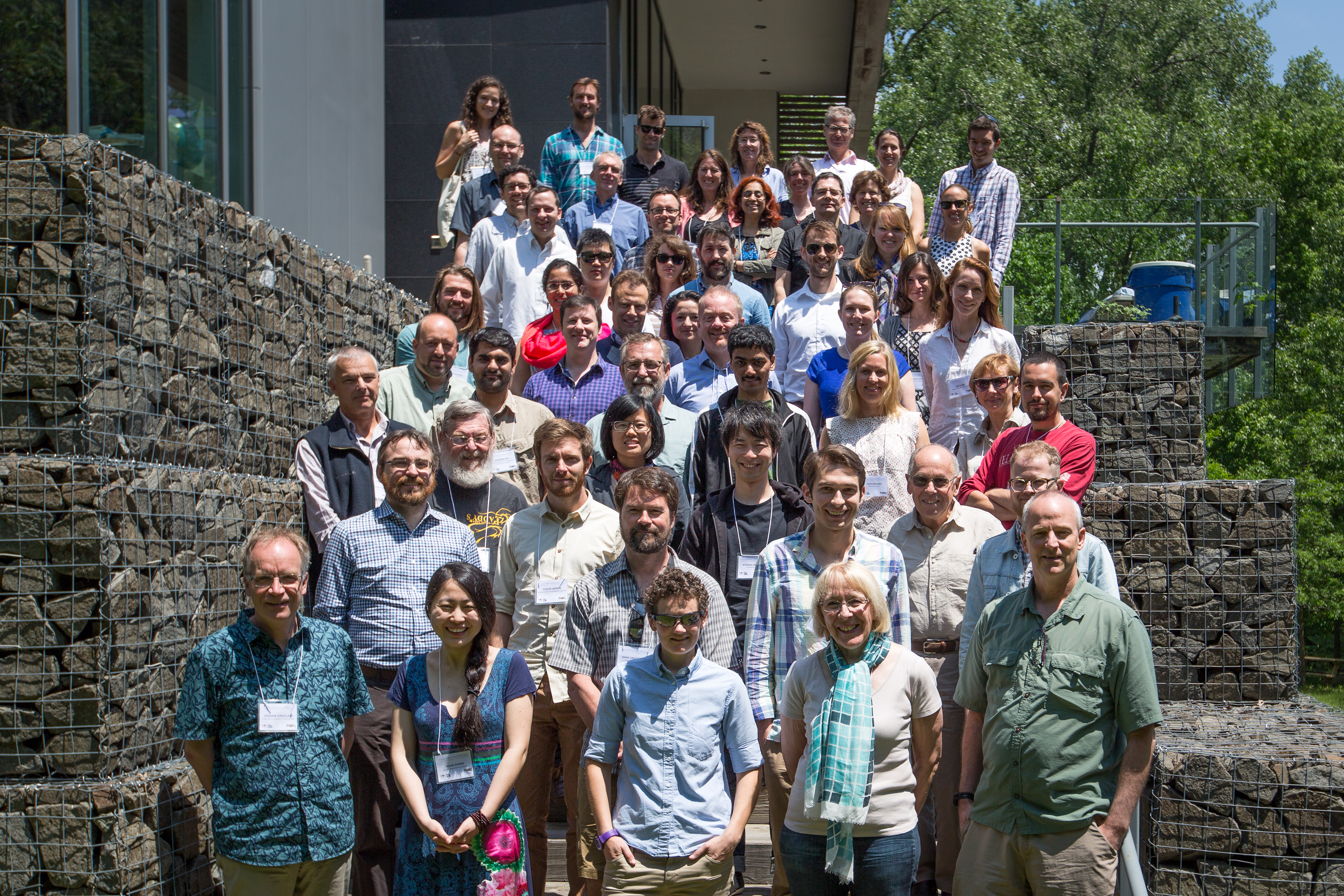Agenda
The agenda of the meeting was divided into four main themes:
1) Hydroclimate Proxies and Large-Scale Syntheses
2) Model Simulations of the Common Era
3) Data-Model Comparisons
4) Proxy System Modeling, Data Assimilation and Proxy Comparisons
A pdf copy of the complete agenda is available here. Copies of most presentations from the workshop and a description of the outreach event organized in conjunction with the workshop are also described in the sections that follow.
1) Hydroclimate Proxies and Large-Scale Syntheses
2) Model Simulations of the Common Era
3) Data-Model Comparisons
4) Proxy System Modeling, Data Assimilation and Proxy Comparisons
A pdf copy of the complete agenda is available here. Copies of most presentations from the workshop and a description of the outreach event organized in conjunction with the workshop are also described in the sections that follow.

Presentations
Workshop Introduction |
Jason Smerdon, Juerg Luterbacher, and Steven Phipps |
PDF
Hydroclimate over the Common Era from Sr/Ca and Oxygen Isotope Records of Corals | Thomas Felis | PDF
Hydroclimate Signals in Tree-Ring Chronologies Across Time and Space | Kevin Anchukaitis | PDF
Interpreting Past Hydroclimate Variability from Sedimentary Records: Challenges and Considerations | Jessica Tierney | PDF
Australasian Monsoon Variability During the Common Era Inferred from Indo-Pacific Speleothem Records | Michael Griffiths | PDF
Iso2k: A Community-Sourced Global Database of Paleo-Water Isotopes from the Past Two Millennia | Bronwen Konecky and Jud Partin | PDF
An Update on the Arctic 2k Hydroclimate Efforts | Hans Linderholm | PDF
The Role of Tree Ring Drought Atlases in Climate Change Research: State of the Art and Future Developments | Edward Cook | PDF
Warm-Season Precipitation Reconstruction over Asia in the Past Half Millennium: Tibetan Plateau | Huan Zhang | PDF
Last Millennium Simulations at GISS Including Water Isotopes | Gavin Schmidt and Allegra LeGrande | PDF
Simulations of the Common Era in PMIP4/CMIP6: Overview and Specific Issues for Studies of Hydroclimate | Johann Jungclaus | PDF
The Global Monsoon Response to Volcanic Eruptions in the CMIP5 past 1000 Simulations and Model Simulations of FGOALS | Wenmin Man | PDF
An Ensemble of Simulations for the Last Millennium with CESM | Bette Otto-Bliesner | PDF
Hydroclimate Responses to Volcanic Eruptions in CESM | Samantha Stevenson | PDF
What We Talk About When We Talk About Hydroclimate: Challenges in Model/Data Comparisons | Ben Cook | PDF
Droughts in the Last Two Millennia: Challenges in its Definition and Connection to Modes of Variability | Christoph Raible and Flavio Lehner | PDF
Challenges and Opportunities for Data-Model Comparisons in Australia | Ailie Gallant | PDF
Paleoclimate Model-Data Comparisons of Hydroclimate over North America | Sloan Coats | PDF
Hydroclimate Changes in the Tropical Pacific over the Last Millennium: Data-Model Comparisons and Possible Mechanisms | Alyssa Atwood | PDF
A Robust Null Hypothesis for the Role of the Tropical Pacific in Driving Megadrought in Western North America | Toby Ault | PDF
Introduction to Proxy System Modeling | Mike Evans PDF
Model-Data Comparisons: Understanding Water Isotopes in Speleothems | Sophie Lewis | PDF
An Update on Proxy System Modeling and Model-Data Comparison: Progress, Challenges, and Applications | Sylvia Dee | PDF
Assimilation of PAGES2k Continental Temperature Reconstructions using GCM Ensemble Member Selection | Martin Widmann | PDF
Hydroclimate Reconstructions Using Data Assimilation | Nathan Steiger | PDF
Hydroclimate over the Common Era from Sr/Ca and Oxygen Isotope Records of Corals | Thomas Felis | PDF
Hydroclimate Signals in Tree-Ring Chronologies Across Time and Space | Kevin Anchukaitis | PDF
Interpreting Past Hydroclimate Variability from Sedimentary Records: Challenges and Considerations | Jessica Tierney | PDF
Australasian Monsoon Variability During the Common Era Inferred from Indo-Pacific Speleothem Records | Michael Griffiths | PDF
Iso2k: A Community-Sourced Global Database of Paleo-Water Isotopes from the Past Two Millennia | Bronwen Konecky and Jud Partin | PDF
An Update on the Arctic 2k Hydroclimate Efforts | Hans Linderholm | PDF
The Role of Tree Ring Drought Atlases in Climate Change Research: State of the Art and Future Developments | Edward Cook | PDF
Warm-Season Precipitation Reconstruction over Asia in the Past Half Millennium: Tibetan Plateau | Huan Zhang | PDF
Last Millennium Simulations at GISS Including Water Isotopes | Gavin Schmidt and Allegra LeGrande | PDF
Simulations of the Common Era in PMIP4/CMIP6: Overview and Specific Issues for Studies of Hydroclimate | Johann Jungclaus | PDF
The Global Monsoon Response to Volcanic Eruptions in the CMIP5 past 1000 Simulations and Model Simulations of FGOALS | Wenmin Man | PDF
An Ensemble of Simulations for the Last Millennium with CESM | Bette Otto-Bliesner | PDF
Hydroclimate Responses to Volcanic Eruptions in CESM | Samantha Stevenson | PDF
What We Talk About When We Talk About Hydroclimate: Challenges in Model/Data Comparisons | Ben Cook | PDF
Droughts in the Last Two Millennia: Challenges in its Definition and Connection to Modes of Variability | Christoph Raible and Flavio Lehner | PDF
Challenges and Opportunities for Data-Model Comparisons in Australia | Ailie Gallant | PDF
Paleoclimate Model-Data Comparisons of Hydroclimate over North America | Sloan Coats | PDF
Hydroclimate Changes in the Tropical Pacific over the Last Millennium: Data-Model Comparisons and Possible Mechanisms | Alyssa Atwood | PDF
A Robust Null Hypothesis for the Role of the Tropical Pacific in Driving Megadrought in Western North America | Toby Ault | PDF
Introduction to Proxy System Modeling | Mike Evans PDF
Model-Data Comparisons: Understanding Water Isotopes in Speleothems | Sophie Lewis | PDF
An Update on Proxy System Modeling and Model-Data Comparison: Progress, Challenges, and Applications | Sylvia Dee | PDF
Assimilation of PAGES2k Continental Temperature Reconstructions using GCM Ensemble Member Selection | Martin Widmann | PDF
Hydroclimate Reconstructions Using Data Assimilation | Nathan Steiger | PDF

Educational Outreach Event
After the completion of the scientific workshop, two dozen middle and high school educators attended an outreach event designed to present the major themes of workshop focus and to give the teachers an opportunity to interact with scientists in an informal and interactive setting. The event started with presentations by workshop attendees Gavin Schmidt and Kim Cobb discussing their two different approaches to studying Earth’s climate history, one through the use of computer modeling of the climate system and the other through the use of paleoclimatic records. A question and answer session followed the two presentations, afterwhich the teachers were given a chance to divide into small groups and pursue discussions with additional scientists from the workshop to discuss their research and ideas for inquiry-based learning activities for high-school students. An Earth Institute news piece on the event is available here.
 Image Credit: Francesco Fiondella
Image Credit: Francesco Fiondella